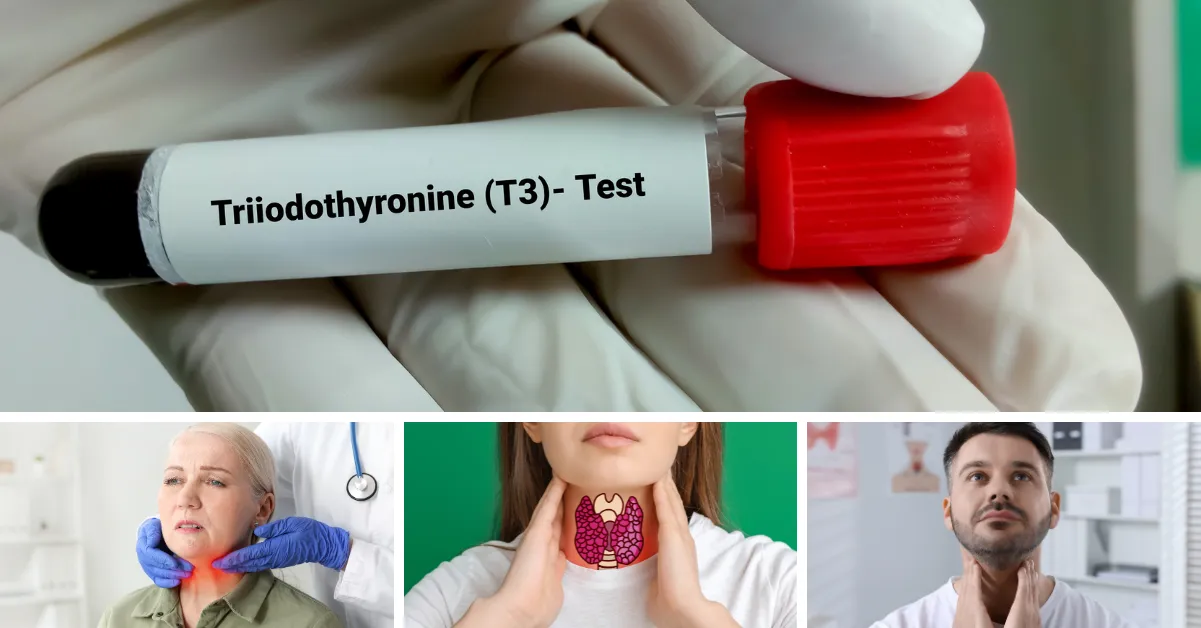Thyroid problems can indeed have a profound impact on an individual’s overall health and well-being.
-
Common Types of Thyroid Problems
- Physical Symptoms Associated with Thyroid Problems
- Emotional and Psychological Symptoms
- Cognitive Symptoms
- How Thyroid Problems Can Affect Different Body Systems
- Risk Factors and Potential Causes of Thyroid Problems
- Importance of Early Detection and Diagnosis
- Diagnostic Tests Used to Identify Thyroid Problems
- Treatment Options Available for Thyroid Problems
- Lifestyle Changes and Self-Care Strategies
- Potential Complications and Long-Term Effects of Untreated Thyroid Problems
- Know if you're at risk for thyroid problems
- Source & Credits:
Definition and Function of the Thyroid Gland
- The thyroid gland, located in the neck, is a crucial component of the endocrine system.
- Its primary function is to produce hormones, mainly thyroxine (T4) and triiodothyronine (T3), which regulate the body’s metabolism, energy production, and numerous vital functions.
Common Types of Thyroid Problems
Hypothyroidism
- This condition occurs when the thyroid gland is underactive and fails to produce sufficient thyroid hormones.
- Symptoms include unexplained weight gain, fatigue, intolerance to cold, dry skin, and constipation.
Hyperthyroidism
- Hyperthyroidism results from an overactive thyroid gland, leading to excessive hormone production.
- Early warning signs of hypothyroidism: Symptoms can manifest as unintended weight loss, rapid heartbeat, anxiety, and tremors.
Thyroid Nodules
- Thyroid nodules are abnormal growths within the thyroid gland, and while most are noncancerous (benign), some can be cancerous (malignant).
- They might not display symptoms initially but can be detected through physical examination or imaging.
Physical Symptoms Associated with Thyroid Problems
- Changes in weight (either gain or loss), fatigue and weakness, hair loss or changes in hair texture, sensitivity to temperature fluctuations, dry skin, and brittle nails, as well as muscle aches and joint pain.
Emotional and Psychological Symptoms
- Mood swings and irritability
- Anxiety and nervousness (every day in hyperthyroidism)
- Depression and low mood (common in hypothyroidism)
- Difficulty sleeping and concentrating
- Memory problems and brain fog
Cognitive Symptoms
- Brain fog, which refers to mental confusion or reduced cognitive function
- Difficulty concentrating and processing information
- Slower reaction times
How Thyroid Problems Can Affect Different Body Systems
- Cardiovascular: Thyroid disorders can alter heart rate and rhythm, potentially leading to palpitations, high blood pressure, or even heart disease.
- Reproductive: Thyroid issues can disrupt menstrual cycles, fertility, and libido in both men and women.
- Gastrointestinal: Hypothyroidism may slow down digestion, leading to constipation, while hyperthyroidism can cause diarrhea.
Risk Factors and Potential Causes of Thyroid Problems
- Family History: A family history of thyroid disorders increases the risk.
- Autoimmune Disorders: Conditions like Hashimoto’s thyroiditis (for hypothyroidism) and Graves’ disease (for hyperthyroidism) are autoimmune thyroid disorders.
- Iodine Deficiency or Excess: Iodine is vital for thyroid hormone production, and both deficiency and excess can lead to thyroid dysfunction.
Importance of Early Detection and Diagnosis
Early detection is crucial because untreated thyroid problems can worsen over time, leading to severe health complications. Timely intervention can help manage symptoms effectively.
Diagnostic Tests Used to Identify Thyroid Problems
- Thyroid Function Tests: These include measuring TSH, T3, and T4 levels in the blood.
- Thyroid Ultrasound: Used to visualize the thyroid gland and detect nodules or abnormalities.
Treatment Options Available for Thyroid Problems
- Medication: Thyroid hormone replacement therapy for hypothyroidism, and anti-thyroid drugs or radioactive iodine therapy for hyperthyroidism.
- Surgery: Surgical removal of part or all of the thyroid gland may be necessary in some cases.
Lifestyle Changes and Self-Care Strategies
- Diet: A balanced diet with sufficient iodine is essential.
- Stress Management: Stress can exacerbate thyroid problems, so stress-reduction techniques are valuable.
- Exercise: Regular physical activity can help regulate metabolism and alleviate some symptoms.
Potential Complications and Long-Term Effects of Untreated Thyroid Problems
- Untreated hypothyroidism can lead to heart disease, infertility, and mental health issues.
- Untreated hyperthyroidism can result in heart problems, brittle bones, and eye problems (in Graves’ disease).
Know if you’re at risk for thyroid problems
It’s essential to pay close attention to warning signs that might signal an underlying immune system imbalance like a thyroid disorder. Knowing the early signs and acting upon them fast will increase your chance of restoring balance and health to your system.
Some risk factors for thyroid problems include:
- Gender: As a matter of fact, Women are at a higher risk for thyroid disorders than men.
- Age: Accordingly, Thyroid problems can occur at any age, but the risk increases with age.
- Family history: If you have a close family member with a thyroid disorder, you may be more likely to develop one.
- Medical history: Certain medical conditions, such as autoimmune diseases, can increase your risk of developing thyroid problems.
- Radiation exposure: In any case, radiation exposure, especially to the neck or head, increases the risk of thyroid disorders.
- Iodine levels: Both too little and too much iodine can lead to thyroid problems.
- Pregnancy: In fact, Pregnancy and the postpartum period are risk factors for thyroid disorders.
Conclusion:
Several risk factors may increase the likelihood of thyroid problems. Firstly, a family history of thyroid disorders can increase one’s risk. Secondly, age is also a significant factor, as the risk of thyroid problems increases.
Additionally, women are at a higher risk of developing thyroid problems than men.






Understanding the connection between thyroid function and hypertension is crucial for managing both conditions. Regular check-ups, lifestyle changes, and appropriate treatment can help maintain optimal thyroid health and blood pressure levels.
including foods like leafy greens, fish, nuts, and seeds in your diet, you can ensure you’re getting the necessary nutrients to support your thyroid
I was diagnosed with thyroid issues last year, and it took a while to recognize the signs.
Your point of view caught my eye and was very interesting. Thanks.
There’s increasing evidence to suggest that low levels of vitamin D (deficiency of Vitamin D ) may play a role in thyroid disorders.
It’s so important to be aware of how thyroid changes can affect women around 50. Many symptoms can be mistaken for menopause, so getting regular thyroid checks is crucial.